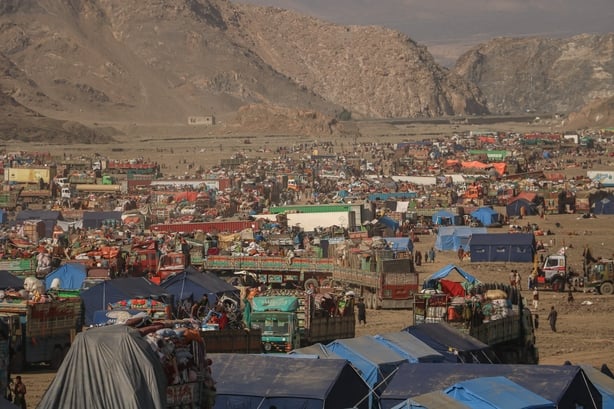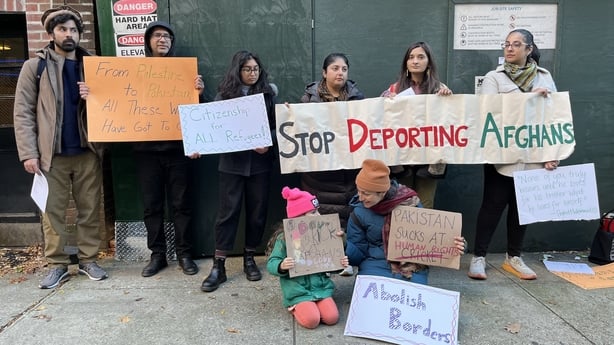The UN refugee Agency, UNHCR, has called on the government of Pakistan to halt the forced deportation of Afghan refugees to Taliban-controlled Afghanistan, amid human rights and humanitarian concerns.
But Pakistan's Ambassador to the United Nations told RTÉ News his country rejected criticism of its policy.
An estimated 1.7 million Afghans are estimated to be affected by the order to repatriate undocumented foreigners, which came into effect on Wednesday.
UN agencies said that they were deeply concerned for the safety and well-being of children and families and "alarmed at the potential consequences", of the plan’s implementation.
Afghanistan is already in the grip of a worsening humanitarian crisis as winter approaches, with 30 million people in need of aid, the UN said.
Human rights groups reported that many of the returnees were families, including children, who had lived their whole lives in Pakistan and were being forced to return to a country that is unknown to them.
More recent arrivals, who fled Afghanistan after the Taliban takeover in 2021, are also at risk of being sent back.

Opponents to the Taliban’s repressive policies, including human rights defenders, women’s rights activists and journalists are likely to face reprisals, according to Heather Barr of Human Rights Watch.
"The Taliban have been killing people that they see as enemies," Ms Barr said.
"They have been arbitrarily detaining and torturing people that have fallen afoul of their rules, who have criticised their policies and protested against them," she said, adding that it was illegal to send people back into harm’s way.
Metra Mehran, a human rights advocate, escaped from Afghanistan in 2021 and now lives in Virginia, United States. In a telephone interview, she said that women who had already been imprisoned, tortured and raped by the Taliban were at risk of being forced to return.
"Going back means imprisonment, torture and death for them," Ms Mehran said.
"I am 100% sure that they will be detained at the border," she said.
"I know the world is in a crazy, crazy, crazy phase now," she added, "but if there is a little chance that we care about human dignity, those people really don't deserve this."
This is a failure to protect vulnerable refugees not just by Pakistan, but by other countries in Europe and North America too, who did not fulfil their obligations under re-settlement agreements, said Ms Barr.
"This is a failure of the international community,"
Pakistan’s Ambassador to the United Nations Munir Akram rejected criticism of Pakistan’s deportation order, which he said was aimed at repatriating "illegal foreigners" in accordance with their laws and would be carried out "as humanely as possible".
He said that his government had not received any information about individuals who may be at risk upon return.
"These are presumptive allegations that there will be rights violations," he said.
"These are frivolous," he said.
Pakistan had hosted more than four million Afghan refugees for decades, the ambassador said.
"Did you think about the human rights of these people for 40 years, when we were looking after them, when you ignored them, when you provided no support?" he asked.
"And now you talk about human rights," he added. "This is unfair for Pakistan, and we reject these kinds of allegations."
In a previous statement, the US Ambassador to Pakistan, Donald Blome, said the United States had provided more than $273 million in humanitarian assistance for Afghan refugees in Pakistan and Pakistani host communities since 2002.
Asked if he had concerns about what it meant for women and girls being forced to live under the Taliban, which bans them from work and education, Mr Akram said that Afghanistan had its own laws.
"They have their own laws about women being clothed in the right way, being with their families and not being alone," he said.
"That is their laws and their business," he said.
Mr Akram then questioned why the onus was being placed on Pakistan.
"If you're worried about the girls and women," he said, "take them!"
"Take them into the United States," he said.
Outside the Consulate of Pakistan on New York’s Upper East Side, a small group of protesters gathered.
"We are asking Pakistan’s government to reverse their decision," said Shehzil Shah from SALAM (South Asian Left).
"Regardless of their status - whether they are refugees or not - we know that returning to Afghanistan isn’t safe for them," she said.

UNHCR reported that the majority of Afghans were now returning out of fear of arrest or deportation in Afghanistan.
Yesterday, UN agencies reiterated their appeal to the government of Pakistan to suspend the repatriation order.
"We are appealing to the authorities not to force vulnerable people, including children and families back to a situation where their lives may be at risk," said Mio Soto, of IOM (International Organisation for Migration).
Ms Mehran hoped this latest crisis will spur on other countries to speed up their processes for Afghans seeking protection.
"I hope it will force Canada, Australia, the UK, US and Germany to do the work faster," she said. "But the past two years have made me very pessimistic."







